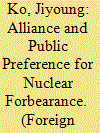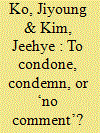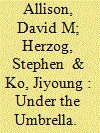|
|
|
Sort Order |
|
|
|
Items / Page
|
|
|
|
|
|
|
| Srl | Item |
| 1 |
ID:
168592


|
|
|
|
|
| Summary/Abstract |
How does a patron state dampen a client state's domestic aspirations for developing nuclear weapons? What nonproliferation tools most effectively induce a client state's domestic preference for nuclear forbearance? This article assesses the relative effectiveness of three nonproliferation tools available to a nuclear patron: a declaration of extended deterrence, forward deployment of nuclear weapons, and a conditional threat of punishment. More specifically, using experimental data on the South Korean public, this article examines whether nuclear forward-deployment and a conditional threat of punishment are more effective than a declaratory policy in enhancing the credibility of extended deterrence and curbing public aspirations for nuclearization. The experimental results show that neither nuclear forward-deployment nor a conditional threat of punishment reduces public support for nuclear armament significantly more than a declaratory policy. They also reveal that compared to when a nuclear ally does not exist, the three nonproliferation tools do not necessarily dampen the public's preference for developing indigenous nuclear weapons. The robustness of the findings is assessed using an experiment on a small sample of government officials. Taken together, this study provides the first experimental evidence on public perception of different nonproliferation tools in a client state.
|
|
|
|
|
|
|
|
|
|
|
|
|
|
|
|
| 2 |
ID:
173899


|
|
|
|
|
| Summary/Abstract |
What explains a patron’s decision to publicly condone, condemn, or forgo commenting on its client’s unilateral provocations? We present a new theoretical framework that identifies a patron’s two strategic considerations – maximizing its sphere of influence and avoiding entanglement – and factors that affect them. We claim that whenever a patron faces a great power rivalry or a vulnerable client, it is more likely to condone its client’s provocations in order to safeguard its sphere of influence. On the other hand, when the risk of escalation looms large, the patron is more likely to condemn its client’s provocations in order to avoid entanglement. Focusing on the Sino-North Korean patron–client relationship, we test our theory on an original dataset that tracks China’s official reactions to provocations initiated by North Korea. We find that China tends to condone North Korea’s provocations when the USA criticizes them, and refrains from condemning when North Korea is domestically fragile. We also find that China is more likely to condemn its client’s provocations in the period after North Korea became a nuclear state. In addition, we draw on examples from the USA–Pakistan and the USA–Israel patron–client relationships to illustrate our causal logic. This article offers new insights on how a patron manages its client’s unruly behavior, and provides the first large-N evidence on China’s responses to North Korean provocations from 1981 to 2016.
|
|
|
|
|
|
|
|
|
|
|
|
|
|
|
|
| 3 |
ID:
188823


|
|
|
|
|
| Summary/Abstract |
How robust is public support for extended nuclear deterrence in patron and client states? Recent studies have improved scholarly understanding of US public opinion about nuclear weapon use against non-nuclear adversaries. Yet, there is limited knowledge of public attitudes regarding retaliation for nuclear strikes against US allies. We develop a theoretical typology of nuclear crises and investigate this phenomenon with a novel survey experiment (n = 6,623). Americans, Japanese, and South Koreans viewed realistic emergency alert messages about a most-likely case for nuclear retaliation: a North Korean missile attack on a US ally protected by the nuclear umbrella. Support for nuclear retaliation is low in all three countries, with important cross-national differences. Favorability increases with North Korean nuclear first-use, but it remains limited nonetheless. Surprisingly, US “tripwire” troop casualties do not increase Americans’ demands for nuclear retaliation. These findings have important implications for the study of nuclear crises and practice of extended deterrence.
|
|
|
|
|
|
|
|
|
|
|
|
|
|
|
|
|
|
|
|
|